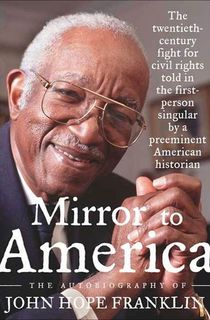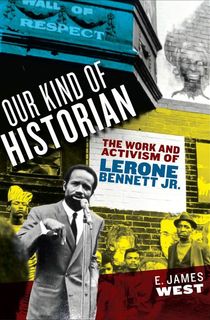Black history wasn’t always a respected area of academic study, nor were Black historians readily accepted into university programs and teaching positions. While much progress has been made since the civil rights movement, unfortunately, Black history is still under attack today.
This Black History Month, we’re persevering in our efforts to honor the past by reflecting on the contributions of three Black historians who overcame prejudice in their lives and careers to advance our knowledge and understanding of Black history.
John Hope Franklin
1915 - 2009

Franklin with President Bill Clinton at an event for the One America Initiative, 1998.
Photo Credit: WikipediaJohn Hope Franklin came from a line of activists: his father was a civil rights lawyer best known for defending survivors of the 1921 Tulsa race massacre, when white citizens attacked, looted, and burned down the wealthiest Black community in the U.S., known as “Black Wall Street”. His parents named their son after John Hope, the first Black president of Atlanta University; his own career would mirror his namesake.
At the outbreak of the Second World War, Franklin applied to a Navy clerical position as well as a War Department historical project. Like many Black Americans at the time, he grew disillusioned when the country rejected his attempts to help the war effort on the basis of his skin color. Later, he served on the NAACP Legal Defense Fund team led by Thurgood Marshall, and worked on the case for Brown v. Board of Education, the landmark ruling that declared segregation in schools unconstitutional.
Franklin’s teaching career began at Fisk University, the historically Black university that he had graduated from in 1935. He then taught at Howard University for nearly a decade before being selected to chair the history department at Brooklyn College. He was the first person of color to head a major history department. His long career also saw him teaching at the University of Chicago and Duke University.
Franklin is best known for his book From Slavery to Freedom, first published in 1947 and now on its tenth edition. More than three million copies have been sold of this lauded account that charts the entire history of Black Americans. In 1995, he was awarded the Presidential Medal of Freedom. In 2005, at 90 years old, Franklin published and lectured on his autobiography, Mirror to America, which shares his experiences with racism and the transformations he saw over his lifetime.
Rosalyn Terborg-Penn
1941 - 2018

Rosalyn Terborg-Penn discusses temperance and women's suffrage at a 2015 panel.
Photo Credit: WikipediaRosalyn Terborg-Penn was a lifelong activist who helped advance the study of Black women’s history. Born to an American mother and a Surinamese father in Brooklyn, she studied history at Queens College during the height of the civil rights movement. Her activism included leading a protest when Queens College refused to allow Malcolm X to speak on campus and attending the historic March on Washington in 1963.
Terborg-Penn moved to Washington, D.C., where she earned her master's degree in United States diplomatic history from the George Washington University and her Ph.D. from Howard University in African-American history. She embarked on a teaching career at Morgan State University, where she developed the first Ph.D. program for history students, as well as the University of Maryland, Baltimore and Howard Community College.
During this time, Terborg-Penn’s colleague and friend Sharon Harley recalls, “We frequently bemoaned the failure of white women’s suffrage historians (like the women suffragists decades earlier) to give more than a passing reference (if any) to the black women...In keeping with the spirit of these black women and male suffragists and the Howard (HBCU) spirit, rather than being angry about the situation, we took action.”
Together, they wrote and published a pioneering book on the subject, The Afro-American Woman: Struggles and Images. Terborg-Penn’s lifelong interest in the subject of Black women suffragettes later led her to publish her most well-known book, African American Women in the Struggle for the Vote, 1850–1920. The groundbreaking 1998 text argues that traditional narratives have erased Black women’s contributions and identified more than 120 key women who had been overlooked by historians. Terborg-Penn also co-founded the Association of Black Women Historians.
Lerone Bennett Jr.
1928 - 2018

Lerone Bennett Jr. in his office at Johnson Publishing Company headquarters, 1973.
Photo Credit: WikipediaBorn and raised in Mississippi, Lerone Bennett Jr. attended Morehouse College in Atlanta, Georgia, a historically Black men’s liberal arts college where he worked on the school newspaper. During those formative years, Martin Luther King Jr. and other like-minded classmates influenced his intellectual development.
Bennett served during the Korean War, after which he began his career writing for the Atlanta Daily World. He then joined Johnson Publishing Company in Chicago, working first for Jet and then for Ebony, two magazines covering topics of interest to the Black community, both of which are still in circulation. He penned a Black history series in Ebony that would later form the basis for his book Before the Mayflower, which examines Black American history from its origins in western Africa up to 1961.
Bennett also wrote Forced into Glory, a biography of Abraham Lincoln that challenges his reputation as “the Great Emancipator”, and What Manner of Man, a biography of Martin Luther King Jr. Dedicated to uplifting the Black community and chronicling their history, he had an advisory role with the National Museum of African American History and Culture and was recognized as a “foot soldier” for the civil rights movement at Atlanta’s International Civil Rights Walk of Fame.
Bennett passed away on February 14, 2018, the same day that Frederick Douglass’s 200th birthday was observed, a coincidence that historian E. James West described as fitting, since Bennett “had long been a fan of Douglass. He recognized the extent of his bravery, acknowledged the depth of his commitment, and appreciated his efforts to ‘uplift the race.’”






